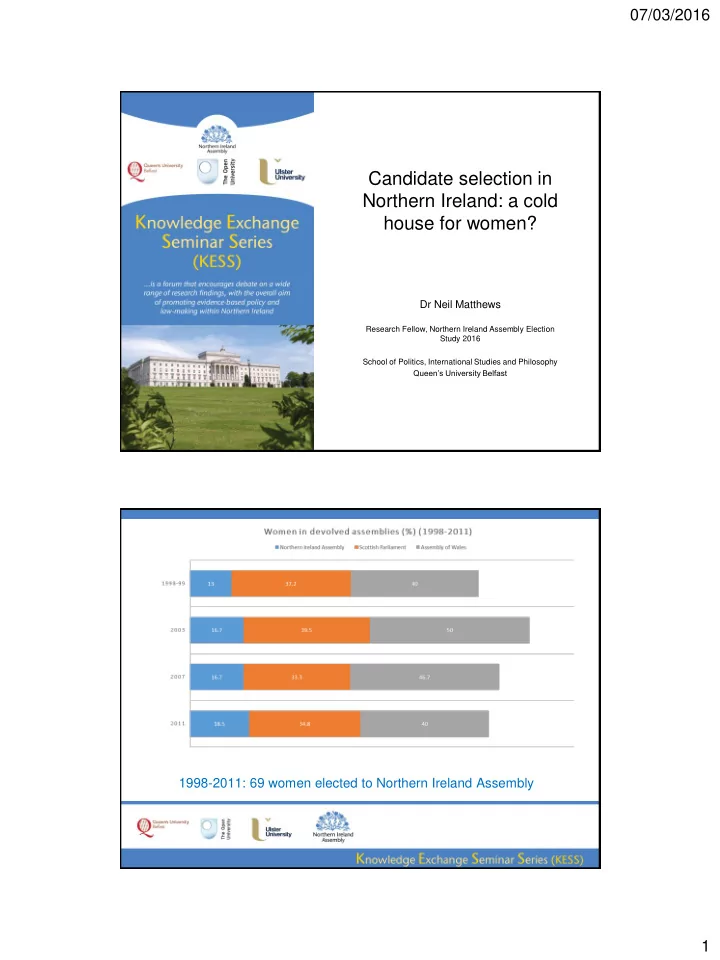

07/03/2016 Candidate selection in Northern Ireland: a cold house for women? Dr Neil Matthews Research Fellow, Northern Ireland Assembly Election Study 2016 School of Politics, International Studies and Philosophy Queen’s University Belfast 1998-2011: 69 women elected to Northern Ireland Assembly 1
07/03/2016 Gender balance in Northern Ireland local councils (%) (1977-2014) 100 90 80 70 60 50 40 30 20 24.1 24.8 21.7 10 19 17.7 14.3 14 10.9 9.5 9.9 0 1977 1981 1985 1989 1993 1997 2001 2005 2011 2014 Women Men Women MLAs (1998-2011) (%) 35 30 25 20 15 10 5 0 DUP UUP APNI SF SDLP 1998 2003 2007 2011 2
07/03/2016 Women councillors (1985-2014) (%) 45 40 35 30 25 20 15 10 5 0 1985 1989 1993 1997 2001 2005 2011 2014 DUP UUP APNI SF SDLP Other Women candidates in Assembly elections (1998-2011) (%) 45 40 35 30 25 20 15 10 5 0 DUP UUP APNI SF SDLP Other 1998 2003 2007 2011 3
07/03/2016 Political gender inequality: the five C’s Confidence : women are less likely to go forward for selection Cash : women have less access to financial resources than men Culture : political culture tends to be dominated by men Childcare : women are more likely to have this primary responsibility Candidate selection : how political parties select candidates discriminates against or disadvantages women Democratic Unionist Party 4
07/03/2016 Alliance Party Ulster Unionist Party 5
07/03/2016 Social Democratic and Labour Party Sinn Féin 6
07/03/2016 Candidate selection: overview • Candidate selection in Northern Ireland is highly decentralised • Long-standing organisational tradition that grassroots party members are privileged actors in the process • Candidate selection is a key incentive for members to engage in party activity, not least campaigning and fundraising: ‘I think the dynamic of selecting a candidate is the lifeblood of a local political party.… It is a great driving force within local organisations’ [interview with SDLP MLA, March 2013] ‘By picking who they [local members] feel are the right people, they are much more likely then – knowing that they have had that influence – to throw themselves into the campaign and really get behind the people they have chosen. And we have then, as the leadership, the right to go back and say: ‘You picked these people, now go get them elected. This is your responsibility. You chose them, go sell them’ . Which you can’t do if you impose a candidate because the members will say, ‘Well it’s not down to us, you picked them’ [interview with Alliance MLA, June 2013] Candidate selection: overview • Decentralised candidate selection processes more likely to produce unrepresentative tickets • However, there is a clear trend of centralisation occurring in respect of candidate selection in Northern Ireland – with central party leaderships acquiring more (formal) authority in recent years • From a gender equality perspective this is an encouraging development – appears to be partly motivated by concerns over representation: ‘The party at times has allowed itself to suffer from its democratic nature. … We can’t allow ourselves to be in a situation where because our decision-making on candidate selection is invested so heavily in the membership that there isn’t a strategic outlook being influenced and informed from the party centrally. So there is a balance to be struck, so that you can have strong democratic choice, authentically selected local candidates, but you also have a more strategic candidate offer being made across the North as a whole’ [Interview with SDLP MLA, April 2013] 7
07/03/2016 A supply issue? ‘I don’t know that many political parties who are having their door knocked down by women wanting to put their head above the parapet and stand for selection. There is a degree of competition in every selection process but there isn’t the flood that people imagine [and] so the notion that parties are rejecting vast numbers of women and trying to keep them out of politics is actually really flawed’ [interview, Alliance MLA, June 2009] ‘It’s not the selection process . . . What you need to look at is what deters women from standing for election’ [interview, Sinn Fein MLA, April 2009] ‘There are plenty of women there. Wanting to run is a whole different ball game’ [interview, DUP councillor, July 2009] • The other four C’s: confidence, culture, childcare and cash • See recommendations in AERC ‘Women in Politics’ report (2015) Thanks! Neil Matthews n.matthews@qub.ac.uk Northern Ireland Assembly Election Study 2016 http://www.qub.ac.uk/sites/NIAES2016 8
07/03/2016 9
Recommend
More recommend